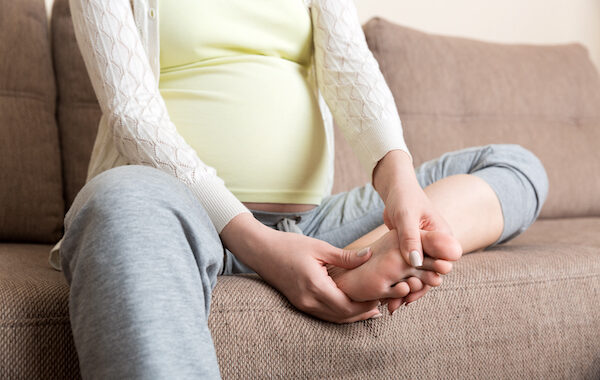During pregnancy, it is common for women to feel various aches and pains throughout their bodies. Among these problems are fatigued, swollen, sore feet which are common and uncomfortable symptoms of pregnant women during their nine months of pregnancy.
Most women gain 25 to 35 pounds during pregnancy, this weight gain puts additional strain on the knees and ankles, resulting in heel discomfort, arch pain, and pain in the ball of the foot (metatarsalgia). Luckily, all of these problems can be managed and avoided with special footwear designed for pregnant women and additional foot care routines.
Before you bid farewell to your shoe collection and anticipate the emergence of swollen feet, read the foot care tips below.
What to Do
It is very common for a woman to change shoe sizes multiple times during her pregnancy. In fact, during pregnancy, a woman’s foot size can increase by 2 to 10 millimeters (0.1 to 0.4 inches). Therefore, it is necessary to adjust footwear accordingly. Do not slip on shoes that are too small or lack padding and support for your swollen feet. Going up a size and adding custom-fit orthotics to shoes will keep your feet comfy and supported. If you continue to wear your pre-pregnancy shoes, you risk developing bunions (also called hallux valgus) and metatarsalgia.
Edema, which occurs when the body traps excess water and causes swelling, is one of the most common foot concerns that arise during the later months of pregnancy. Although swelling is common throughout pregnancy and usually goes away after the baby is born, women should be careful about edema symptoms. Facial swelling or a sudden onset of swelling could be an indication of a more serious pregnancy complication known as pre-eclampsia (or toxemia), which should be treated immediately.
Edema can be mitigated by reducing salt in your diet, elevating your feet whenever possible, and taking a hot bath to reduce swelling. Wearing compression stockings can also help, as it improves blood flow and circulation, which reduces swelling and relieves foot pain.
Overpronation is another serious foot problem that can spring up during pregnancy. It occurs when a person’s arch flattens and stretches when they bear additional weight, causing the feet to roll inward. This condition occurs when the plantar fascia, a dense band of fibrous tissue in the arch of the foot, gets strained and inflamed as a result of flat feet. Because of the 25 to 35-pound weight gain, which stresses the feet and flattens the arches, overpronation is very common during pregnancy. This condition can make walking extremely painful for pregnant women.
Overpronation can be treated with custom-fit orthotics, which can correct alignment and reduce pain and discomfort. Again, wearing compression stockings can help as it improves blood flow and circulation, which reduces swelling and relieves foot pain.
Foot Problems Associated with Pregnancy
- Overpronation
- Edema in foot and ankle
- Pain in the arch of the foot
- Heel pain
- Metatarsalgia (ball of foot pain)
Treatments
- Wear orthotics
- Wear lightweight shoes with breathable fabric, a soft footbed, and excellent support for flat arches
- Wear compression stockings to help with blood flow and circulation
- Practice Reflexology (zone therapy)
- Stretch your feet frequently to ease tense muscles
- Take hot baths to reduce swelling in your feet
Daily Tips
- To reduce foot pressure and swelling, take short breaks throughout the day and elevate your feet whenever possible
- Drink plenty of water to stay hydrated and avoid cramping
- Reduce swelling by reducing your salt intake
- Walk to increase circulation in legs and feet
- Do not walk barefoot
Pregnancy should be a joyful and exciting experience. Understanding the reasons for foot discomfort and pain while learning simple home remedies can help women walk more comfortably during these nine months.

